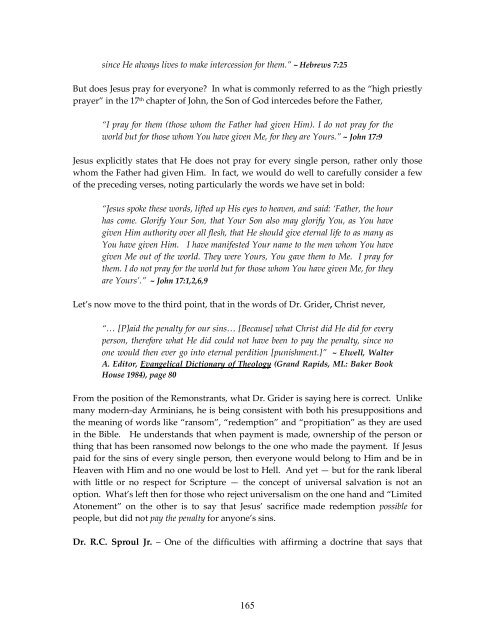AG STUDY GUIDE FINAL - The Forerunner
AG STUDY GUIDE FINAL - The Forerunner
AG STUDY GUIDE FINAL - The Forerunner
You also want an ePaper? Increase the reach of your titles
YUMPU automatically turns print PDFs into web optimized ePapers that Google loves.
since He always lives to make intercession for them.” ~ Hebrews 7:25<br />
But does Jesus pray for everyone? In what is commonly referred to as the “high priestly<br />
prayer” in the 17 th chapter of John, the Son of God intercedes before the Father,<br />
“I pray for them (those whom the Father had given Him). I do not pray for the<br />
world but for those whom You have given Me, for they are Yours.” ~ John 17:9<br />
Jesus explicitly states that He does not pray for every single person, rather only those<br />
whom the Father had given Him. In fact, we would do well to carefully consider a few<br />
of the preceding verses, noting particularly the words we have set in bold:<br />
“Jesus spoke these words, lifted up His eyes to heaven, and said: ‘Father, the hour<br />
has come. Glorify Your Son, that Your Son also may glorify You, as You have<br />
given Him authority over all flesh, that He should give eternal life to as many as<br />
You have given Him. I have manifested Your name to the men whom You have<br />
given Me out of the world. <strong>The</strong>y were Yours, You gave them to Me. I pray for<br />
them. I do not pray for the world but for those whom You have given Me, for they<br />
are Yours’.” ~ John 17:1,2,6,9<br />
Let’s now move to the third point, that in the words of Dr. Grider, Christ never,<br />
“… [P]aid the penalty for our sins… [Because] what Christ did He did for every<br />
person, therefore what He did could not have been to pay the penalty, since no<br />
one would then ever go into eternal perdition [punishment.]” ~ Elwell, Walter<br />
A. Editor, Evangelical Dictionary of <strong>The</strong>ology (Grand Rapids, MI.: Baker Book<br />
House 1984), page 80<br />
From the position of the Remonstrants, what Dr. Grider is saying here is correct. Unlike<br />
many modern-day Arminians, he is being consistent with both his presuppositions and<br />
the meaning of words like “ransom”, “redemption” and “propitiation” as they are used<br />
in the Bible. He understands that when payment is made, ownership of the person or<br />
thing that has been ransomed now belongs to the one who made the payment. If Jesus<br />
paid for the sins of every single person, then everyone would belong to Him and be in<br />
Heaven with Him and no one would be lost to Hell. And yet — but for the rank liberal<br />
with little or no respect for Scripture — the concept of universal salvation is not an<br />
option. What’s left then for those who reject universalism on the one hand and “Limited<br />
Atonement” on the other is to say that Jesus’ sacrifice made redemption possible for<br />
people, but did not pay the penalty for anyone’s sins.<br />
Dr. R.C. Sproul Jr. – One of the difficulties with affirming a doctrine that says that<br />
165


